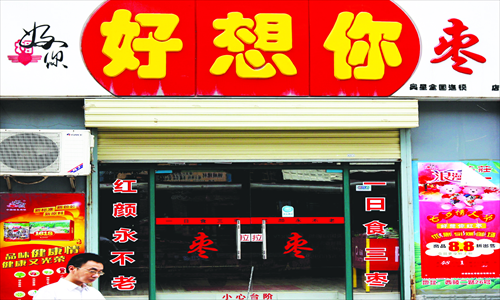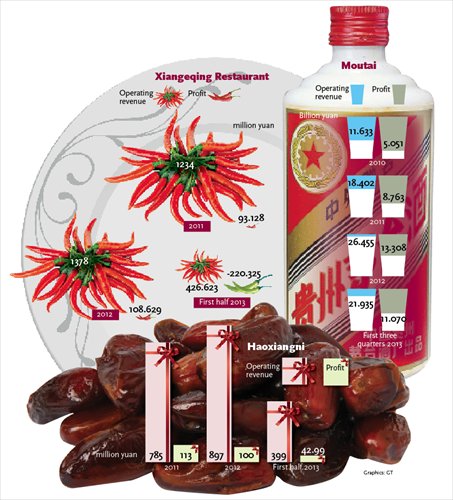HOME >> BUSINESS
Haoxiangni Jujube to close down 600 stores by 2014
Source:Global Times Published: 2013-10-16 23:18:01

A Haoxiangni retail store in Yibin, Central China's Hubei Province Photo: CFP

Graphics: GT
Haoxiangni Jujube Co Ltd, the only listed company in China's jujube industry, has said it will shut down 600 stores by mid-2014, in another recent sign that the government's ongoing anti-corruption campaign is impacting many companies that sell high-end gifts.
Analysts said Wednesday the company should expand its retailing channels to make its selling model sustainable.
Shi Jubin, the chairman of Haoxiangni, which is based in Zhengzhou, Central China's Henan Province, said the company will focus on quality rather than number of franchisees by closing 600 stores, according to a statement released on the company's website Monday.
The company suffered a decrease in revenue and profit in the first six months of 2013, the half-year report showed.
Its half-year revenue was about 399.2 million yuan ($51.48 million), 0.67 percent lower year-on-year and the profit was about 42.99 million yuan, 15.72 percent lower year-on-year.
The statement admitted that the central government's clampdown on official spending on presents has hit its business, and the company is trying to change its product position from high-end presents to daily snack food.
After cooperating with Trout & Partners Ltd, a global consulting firm, in 2012, Haoxiangni started an overhaul of its brand image in 2013 by promoting low-price products for less than 100 yuan, the statement said.
Haoxiangni did not reply to queries from the Global Times by press time.
In previous years, Haoxiangni expanded quickly with low costs by developing franchise stores, Li Weihua, a franchising expert from the Franchise Research Center of China University of Political Science and Law, told the Global Times Wednesday.
In 2008, the company had 479 chain stores across the country and at the end of 2010, the number increased to 1,819, according to its prospectus on China Securities Regulatory Commission's website, noting 91.86 percent of its revenue in 2010 came from franchise stores.
However, in spite of fast growth, franchising can also bring on an investment burden and the risk of substandard service, Li said, noting the company would have to give up franchise stores with poor performances when it encounters difficulties.
The government's restriction on official spending on gifts has resulted in hard times for some companies, Zhu Danpeng, an analyst with Hanzhou-based food industry research firm 21food.cn, told the Global Times Wednesday.
Jujube is not a rare food but Haoxiangni once sold gift boxes of jujube for several hundred yuan, Zhu said. The brand's high-end image was its main attribute but now it is hard to maintain.
Besides Henan Province, there are also other places of jujube production such as East China's Shandong Province and North China's Shanxi Province, Zhu said. Compared with jujubes from these regions, Haoxiangni's products do not have any significant advantage, noted Zhu.
The company has to make changes, including on retailing channels, Zhu said.
It is the first time it has seen a decline in revenue since being listed in 2011.
In the high-end food and liquor industry, Haoxiangni is not the only company which has been affected by cooling sales, analysts said.
Kweichow Moutai Co reported a profit of 11.07 billion yuan for the first half of 2013, a year-on-year increase of 6.24 percent, the weakest growth for the company in three years.
Eight out of 13 listed Chinese liquor companies suffered a decline in year-on-year profit growth, according to their semi-annual reports released in early September.
Beijing Xiangeqing Group Co, a high-end chain, closed eight restaurants in the first half of this year, and had a loss of 220.325 million yuan in the first half of 2013 compared to a profit of 76.5 million yuan over the same period last year, mainly due to the country's ongoing crackdown on officials' extravagant spending habits.
Posted in: Companies